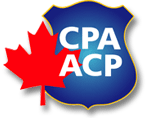
The Royal Canadian Mounted Police is the national police service of Canada. The RCMP is an agency of the Government of Canada; it also provides police services under contract to 11 provinces and territories, over 150 municipalities, and 600 Indigenous communities. The RCMP is commonly known as the Mounties in English.

The Canadian Security Intelligence Service is a foreign intelligence service and security agency of the federal government of Canada. It is responsible for gathering, processing, and analyzing national security information from around the world and conducting covert action within Canada and abroad. CSIS reports to the Minister of Public Safety, and is subject to review by the National Security and Intelligence Review Agency.
The Canadian Firearms Registry is the gun registry of Canada, requiring the registration of all restricted and prohibited firearms in the country. It is managed by the Canadian Firearms Program of the Royal Canadian Mounted Police (RCMP) as part of the RCMP's responsibilities under the Firearms Act, 1995.
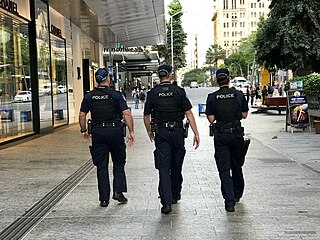
State police, provincial police or regional police are a type of sub-national territorial police force found in nations organized as federations, typically in North America, South Asia, and Oceania. These forces typically have jurisdiction over the relevant sub-national jurisdiction, and may cooperate in law enforcement activities with municipal or national police where either exist.

The Ottawa Police Service is the municipal police service of Ottawa, Ontario, Canada, as well as most of the Ontario side of the National Capital Region. The OPS employs 1,480 officers and 620 staff as of 2022, and serves an area of 2,790 square kilometres and 1,017,449 people, alongside several other police forces which have specialized jurisdiction. Formally established in 1855, the OPS gradually absorbed the police forces of other neighbouring municipalities as Ottawa itself expanded, and experienced multiple mergers and reforms in the process; the current OPS was established in 2001.

Indigenous police services in Canada are police forces under the control of a First Nation or Inuit government.

Law enforcement in Canada is the responsibility of police services, special constabularies, and civil law enforcement agencies, which are operated by every level of government, some private and Crown corporations, and First Nations. In contrast to the United States or Mexico, and with the exception of the Unité permanente anticorruption in Quebec and the Organized Crime Agency of British Columbia, there are no organizations dedicated exclusively to the investigation of criminal activity in Canada. Criminal investigations are instead conducted by police services, which maintain specialized criminal investigation units in addition to their mandate for emergency response and general community safety.
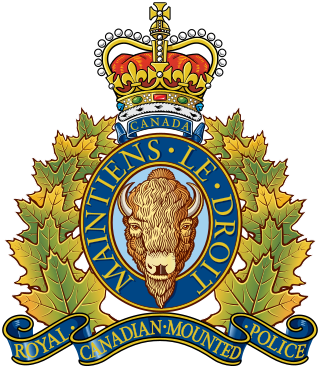
"E" Division is the division of the Royal Canadian Mounted Police in the province of British Columbia, Canada's westernmost province. It is the largest police body in the province, providing federal and provincial services throughout the province and policing all but 12 municipalities. In some urban areas, some municipalities have their own police forces while neighbouring ones contract with E Division. For example, Richmond is patrolled by E Division while neighbouring Vancouver has its own police force; both organizations contribute members and resources to various regional initiatives. E Division is the largest RCMP division, with 127 local detachments.

The Canadian Police and Peace Officers' Memorial is a memorial in Ottawa, Ontario, commemorating approximately 900 Canadian law enforcement officers killed in the course of their duties. Dedicated in 1994, it is located at the northwest corner of the Parliament Hill grounds, overlooking the Ottawa River. The memorial consists of the Police Memorial Pavilion, a reconstruction of a 1877 gazebo by Thomas Seaton Scott, and a glass-and-steel perimeter wall etched with the names of the fallen officers, which was designed by landscape architectural firm Phillips Farevaag Smallenberg.

The Alberta Sheriffs Branch is a provincial law enforcement agency overseen by the Ministry of Public Safety and Emergency Services of the province of Alberta, Canada. Under the authority of the Peace Officer Act, Alberta Sheriffs are provincial peace officers with jurisdiction over the province of Alberta. The premier of Alberta has the authority to grant emergency police powers to all Alberta sheriffs during major emergencies within the province. The Alberta Sheriffs Branch is the largest sheriff service in Canada.
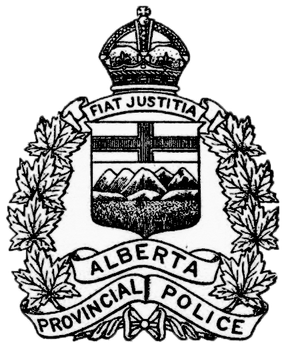
The Alberta Provincial Police (APP) was the provincial police service for the province of Alberta, Canada, from 1917 to 1932. The APP was formed as a result of the Royal North-West Mounted Police (RNWMP) leaving the prairie provinces during the First World War due to a lack of sufficient resources in light of its increased responsibilities for national security and reluctance to again enforce Prohibition law recently put into effect by the Alberta government after its experience doing so during territorial times. The RNWMP was replaced by the newly created Alberta Provincial Police on March 1, 1917, which remained responsible for provincial policing until 1932, when it was eliminated as a cost-cutting measure during the Great Depression. The APP was known for its tumultuous beginning, battles against rum-runners and bootleggers during prohibition in Canada and the United States, as well as its remarkable efficiency and professionalism which endeared the force to Albertans.

Integrated Security Unit (ISU) is a joint-services infrastructure security unit created to secure major events in Canada. This administrative and operational entity was first created by the Royal Canadian Mounted Police (RCMP) in 2003.
The Canadian Police Information Centre is the central police database where Canada's law enforcement agencies can access information on a number of matters. It is Canada's only national law enforcement networking computer system ensuring officers all across the country can access the same information. There are approximately 3 million files generated each year and is the responsibility of the originating agency to ensure the data integrity of each file.
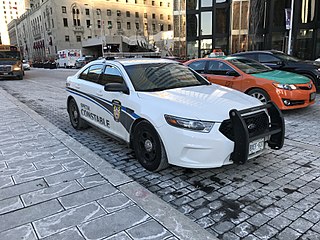
A special constable or special police constable can refer to an auxiliary or part-time law enforcement officer or a person who is granted certain (special) police powers.
The Alberta Serious Incident Response Team is the civilian oversight agency in Alberta, Canada responsible for the investigation of incidents resulted in serious injury or death to any person, as well as serious or sensitive allegations of police misconduct. ASIRT has jurisdiction over all municipal police officers and Royal Canadian Mounted Police "K" Division officers, and for all complaints whether on or off duty related.
The police in Canada's ranks differ according to the different police forces and depend on different laws at the federal, provincial, and municipal levels.
A police union is a trade union for police officers. Police unions formed later than most other occupations, reflecting both a conservative tendency and relatively superior working conditions. The first police unions formed in the United States. Shortly after World War I, the rising cost of living, wage reductions, concerns over amount of rest and growing dissatisfaction among rank and file police officers led to a number of police strikes from 1918–1923 and the formation of police unions globally.

The Surrey Police Service (SPS) is a municipal police force in the city of Surrey, British Columbia, Canada. It is one of several police departments within the Metro Vancouver Regional District, and as of December 2022, the second largest municipal police service in British Columbia. Prior to the SPS's establishment, Surrey was Canada's largest city without a municipal police service. The Royal Canadian Mounted Police, Canada's federal police force, currently has policing jurisdiction in Surrey, and SPS has had difficulty with the transition from the RCMP due to opposition from Surrey mayor Brenda Locke and the municipal government. In April of 2024 the provincial government of British Columbia set a deadline for the transfer of jurisdiction. The Surrey Police Service will transition into the role of municipal policing in Surrey on November 29, 2024.
The National Police Federation (NPF) is the police union representing Regular Members and Reservists of the Royal Canadian Mounted Police (RCMP) below the rank of Inspector. The NPF represents about 20,000 RCMP Members serving across Canada and internationally.
